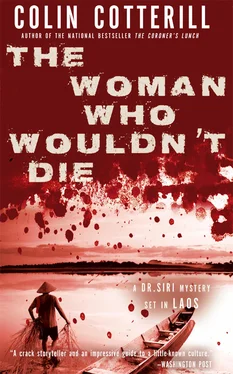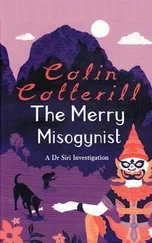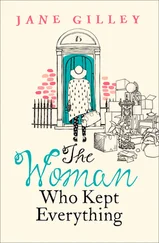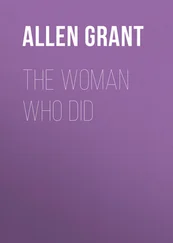Colin Cotterill - The Woman Who Wouldn't die
Здесь есть возможность читать онлайн «Colin Cotterill - The Woman Who Wouldn't die» весь текст электронной книги совершенно бесплатно (целиком полную версию без сокращений). В некоторых случаях можно слушать аудио, скачать через торрент в формате fb2 и присутствует краткое содержание. Жанр: Триллер, на английском языке. Описание произведения, (предисловие) а так же отзывы посетителей доступны на портале библиотеки ЛибКат.
- Название:The Woman Who Wouldn't die
- Автор:
- Жанр:
- Год:неизвестен
- ISBN:нет данных
- Рейтинг книги:3 / 5. Голосов: 1
-
Избранное:Добавить в избранное
- Отзывы:
-
Ваша оценка:
- 60
- 1
- 2
- 3
- 4
- 5
The Woman Who Wouldn't die: краткое содержание, описание и аннотация
Предлагаем к чтению аннотацию, описание, краткое содержание или предисловие (зависит от того, что написал сам автор книги «The Woman Who Wouldn't die»). Если вы не нашли необходимую информацию о книге — напишите в комментариях, мы постараемся отыскать её.
The Woman Who Wouldn't die — читать онлайн бесплатно полную книгу (весь текст) целиком
Ниже представлен текст книги, разбитый по страницам. Система сохранения места последней прочитанной страницы, позволяет с удобством читать онлайн бесплатно книгу «The Woman Who Wouldn't die», без необходимости каждый раз заново искать на чём Вы остановились. Поставьте закладку, и сможете в любой момент перейти на страницу, на которой закончили чтение.
Интервал:
Закладка:
‘I doubt she’ll even be able to book a table,’ he’d told Daeng.
It was therefore not a total surprise when they arrived at the club fashionably late to be met by military guards in full uniform including holstered weapons. They were standing out front checking invitations. There were large placards in Russian and English apologizing to esteemed regular guests for the fact that the restaurant would be closed this evening as it had been booked for a private function.
‘See? What did I tell you?’ said Siri. ‘That really stuffs up Auntie Bpoo’s plans. I bet she didn’t know about this. You’d think a fortune-teller would have predicted it.’
‘Don’t you be so hasty,’ said Daeng. ‘Who’s that sitting over by the railing?’
Siri looked up to see a table of friends waving; Phosy, Dtui, Mr Geung and his fiancee Tukda, Civilai and his wife, Noy.
‘How the hell did they get in?’ Siri asked.
‘I’d say this is Auntie Bpoo’s party,’ said Daeng.
‘Don’t be … How could she?’
Siri walked up the steps where he found a large hand on his chest. He looked up into the face of a middle-aged man in uniform.
‘Invitation,’ said the soldier.
Daeng followed demurely behind her husband.
‘Take your hand off my chest, son,’ said Siri. ‘Do you honestly believe I’d be here without an invitation?’
‘No. But if I don’t see it, I don’t believe it,’ said the military bouncer.
‘You obviously don’t know who I am,’ said Siri.
‘You’re Dr Siri,’ said the soldier. ‘You took a chunk of shrapnel out of my knee once.’
‘Well then.’
‘No invitation, no entry. Sorry.’
‘If I ran past you, do you think you could catch me?’
‘Yes.’
‘Then the operation was a success.’
‘Yes.’
‘Then?’
Madame Daeng laughed and produced her invitation from her sequinned soiree bag. The soldier looked at it and nodded for her to pass.
‘Where’s mine?’ called Siri.
‘You threw it in the bin, remember?’ Daeng told him. ‘Said it was ridiculous to take an invitation to a funeral.’
She walked to the top of the steps, turned around to see the sad sight of her husband behind the barrier, then relented. She returned to the guard and produced a second invitation.
‘I rescued it,’ she laughed.
The place was crowded. The tables were full and others stood around. In 1978 Laos, it was rarely necessary to raise one’s voice. There were the late insect choruses and monsoons on tin roofs and thousand-amp speakers at large gatherings but being heard at social events had hardly been a problem before this. There was no music in the Russian Club that night but everyone was shouting. There was a selection of beverages on each table and an open bar for those who had nowhere to sit. There were spirits and, to Daeng’s delight, red or white wine. They had asked a passing waitress whether she might open a bottle of Cabernet Sauvignon for them. She produced a beer bottle opener and left it on the table for them. Fortunately, Civilai remembered that his Swiss Army knife had a corkscrew attachment.
‘What on earth is going on here?’ Siri asked.
‘Auntie Bpoo’s last stand,’ shouted Civilai.
‘Has anyone actually seen the party girl yet?’ Daeng asked.
‘Not a sign,’ they shouted.
‘I don’t understand it,’ said Inspector Phosy. ‘She’s a street fortune-teller. She reads the cards at five hundred kip a pot. Where did the money come from for all this?’
‘She obviously has other resources,’ said Dtui.
Daeng stood up.
‘Look,’ she shouted. ‘How about we wander down to the river’s edge with our respective bottles so we can actually hear ourselves speak?’
‘We … we might lose our table,’ said Geung.
‘Look at us,’ said Civilai. ‘Do you think anyone would dare take the table of such a scary group?’
Mr Geung laughed and they upped and followed the narrow dirt path to the water. There was a concrete foundation down there for what was once a boat landing. It made a perfect seat.
‘That’s better,’ said Civilai. ‘Who are all those people up there?’
‘It would appear Bpoo has more friends than we thought,’ said Daeng. ‘And it’s invitation only so they aren’t all freeloaders.’
‘And who would have expected all this anyway?’ said Dtui.
‘All right,’ said Siri. ‘While we have a few minutes of quiet, let’s listen to what Phosy has to say about his investigation of the Vietnamese and Madame Peung. We’ve all been on the edge of our seats these past few days.’
In fact, the only person even vaguely likely to fall off his seat had been Siri. It had been a difficult few days for him. He’d done everything Madame Peung had suggested: the breathing exercises, the yoga, the cat’s whisker grass tea. He’d been patient with the spirits he saw. He’d tried not to judge. Not to tell them to their faces that they were scientifically impossible. As the witch had told him time and time again, he had to be an empty house with a sign out front saying VACANCY in large letters. He’d done just that but nobody had knocked on his door. He’d constructed no end of mental devices to lure them inside. He’d even strewn mental nails across the road out front so that souls passing on motorcycles might have a flat tyre and come in to use the telephone. Nothing had worked. But most frustrating was the fact that the used-to-be woman had not made an appearance. He was beginning to have doubts, and Phosy’s findings would help a great deal to maintain his faith.
Phosy had brought along his notebook but he rarely referred to it. He took a sip of his whisky and coughed.
‘Madame Peung,’ he began, and coughed again, ‘was everything we’d heard about her. The wife of a general who got rich by diverting United States funding to his own projects. She was wiser than her husband it seems because she could see the direction this country was headed. Without his knowledge she contacted the Pathet Lao and provided them with donations to fund their underground operations. As a widow, once the PL took over the country, she was on their list of wealthy sympathizers. She made numerous trips to Hanoi and was responsible for a number of profitable deals. Everything seemed to be running as regular as clockwork until this past July when she went missing for eighteen days. I patiently awaited my turn at our central post office and talked to the manager at the hotel she always stayed at in Vietnam. We have a Vietnamese translator at HQ.
‘When she turned up after her mysterious disappearance, she’d told the manager that she had no idea where she’d been. She said she’d woken up in a small clinic somewhere and they told her she’d suffered a brain aneurysm and had been in a coma. The doctor had been very pleased with her recovery and released her. She paid her hotel bill in full and returned to Laos. That night, she was killed.’
‘Sounds like just a little too much of a coincidence to me,’ said Daeng.
‘I talked to her live-in girl about that night,’ said Phosy. ‘She said that Madame Peung had arrived late that afternoon with a truck and a driver. The driver had his hat pulled down over his eyes. There was a crate on the back of the truck. The girl came out to help carry it but Madame Peung called to her from the passenger window and told her to go down to the village and bring ten litres of petrol for the truck. She didn’t know why the truck driver couldn’t go down there himself but she wasn’t one to question orders. By the time she’d lugged the container back up the hill, the truck was gone. Either the crate went with it or it was in the widow’s room, because the girl didn’t see it again. The door to Madame Peung’s room was shut and when the girl asked if she wanted dinner the old lady declined. But it appears that Madame Peung often went to sleep early after a long journey so the girl thought nothing more of it. She went to bed at about nine and, the next thing she knew, she was woken by a shot. She’d been in a deep sleep so she wasn’t sure she hadn’t dreamed it. But the second gunshot most certainly came from inside the house. She wasn’t particularly fond of the job or the widow but she heard footsteps running away so she took a look at the widow’s room. That’s when she saw the body. She ran out the back door and hid in the bushes until she heard the villagers arrive.
Читать дальшеИнтервал:
Закладка:
Похожие книги на «The Woman Who Wouldn't die»
Представляем Вашему вниманию похожие книги на «The Woman Who Wouldn't die» списком для выбора. Мы отобрали схожую по названию и смыслу литературу в надежде предоставить читателям больше вариантов отыскать новые, интересные, ещё непрочитанные произведения.
Обсуждение, отзывы о книге «The Woman Who Wouldn't die» и просто собственные мнения читателей. Оставьте ваши комментарии, напишите, что Вы думаете о произведении, его смысле или главных героях. Укажите что конкретно понравилось, а что нет, и почему Вы так считаете.












